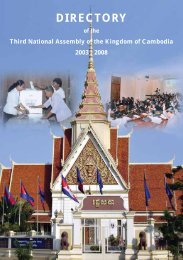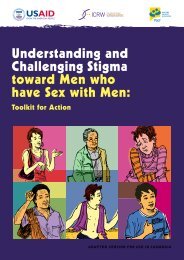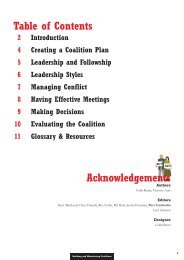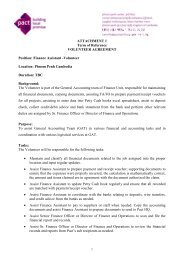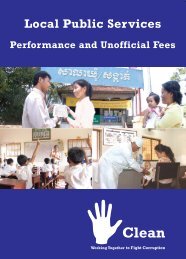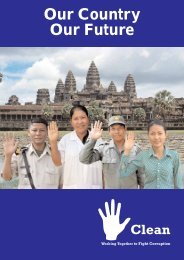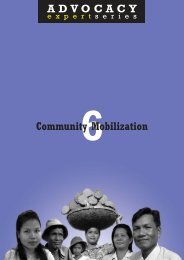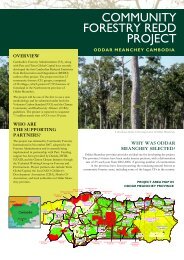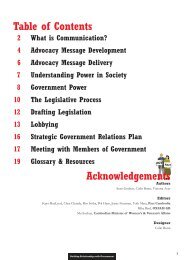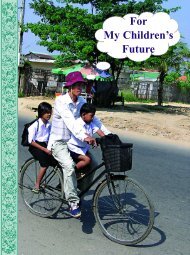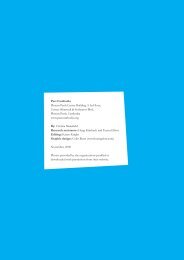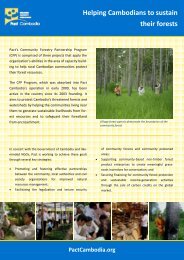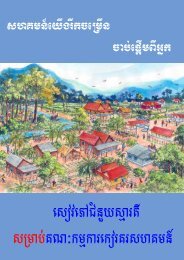Advocacy in Cambodia: Increasing Democratic ... - Pact Cambodia
Advocacy in Cambodia: Increasing Democratic ... - Pact Cambodia
Advocacy in Cambodia: Increasing Democratic ... - Pact Cambodia
Create successful ePaper yourself
Turn your PDF publications into a flip-book with our unique Google optimized e-Paper software.
Protected Forest and Land Dispute:<br />
Tapres Area, Tropeang Reusey Commune, Kompong Svay District, Kompong Thom<br />
A group of private <strong>in</strong>dividuals consist<strong>in</strong>g of national and local authorities and led by a former district chief <strong>in</strong><br />
Kompong Thom illegally controlled 4,000 hectares of state-protected forest <strong>in</strong> Tropeang Reusey Commune. The<br />
group’s goal was to transform the area <strong>in</strong>to a development center called “The Center of Mixed Agriculture.” Actual<br />
ownership of the land <strong>in</strong>cluded: 650 hectares of forest managed by a community forestry group of one village;<br />
1,787 hectares of two new proposed community forestries for five villages, supported by a locally based organization,<br />
Buddhism for Development of Kompong Thom (BFDK); 30% <strong>in</strong>habited by poor m<strong>in</strong>orities <strong>in</strong> eight surround<strong>in</strong>g<br />
villages; and the rema<strong>in</strong>der a public, protected forest <strong>in</strong> Tapres, Trapeang Reusey Commune. The total population<br />
<strong>in</strong> the area equaled 4,305 <strong>in</strong>dividuals (or 834 families), who relied on the forest for their livelihoods.<br />
Villagers brought the issue to the attention of an NGO <strong>in</strong> Kompong Thom, stat<strong>in</strong>g the follow<strong>in</strong>g:<br />
· The forest was the ma<strong>in</strong> livelihood resource for villagers;<br />
· Villagers’ croplands were taken without proper negotiation and compensation;<br />
· The private group had begun to cut and planned to clear all of the trees, even the expensive p<strong>in</strong>e trees, <strong>in</strong> order<br />
to replant the 4,000 hectares with <strong>in</strong>dustrial crops;<br />
· Cattle were barred from enter<strong>in</strong>g the portion of forest controlled by the private group;<br />
· Villagers were be<strong>in</strong>g threatened and an <strong>in</strong>cident had already occurred dur<strong>in</strong>g the resolution process when a<br />
staff from BFDK was killed by armed men;<br />
· <strong>Cambodia</strong> forest law does not allow the cutt<strong>in</strong>g of res<strong>in</strong> trees; and<br />
· A letter from H.E. Prime M<strong>in</strong>ister Hun Sen encouraged community forestry projects.<br />
No local authorities took action on this issue, as high national and local authorities supported the private group.<br />
Thus villagers and local NGOs wrote letters of compla<strong>in</strong>t to authorities at the prov<strong>in</strong>cial level, <strong>in</strong>clud<strong>in</strong>g to those who<br />
supported the private group, seek<strong>in</strong>g their assistance and <strong>in</strong>tervention. An <strong>in</strong>ternational NGO provided <strong>in</strong>tensive<br />
advocacy support to BFDK to enable that group to effectively facilitate and support villagers’ <strong>in</strong>itiatives.<br />
In September 2001, H.E. Hun Sen agreed to two recommendations of his cab<strong>in</strong>et advisors. The first recommendation<br />
was to stop destroy<strong>in</strong>g forests for cashew nut plantation and to protect forests. The second recommendation was<br />
to give responsibility to duty departments and local authorities to take legal measures aga<strong>in</strong>st illegal forestry<br />
activities. The Prime M<strong>in</strong>ister and M<strong>in</strong>istry of Agriculture and Fishery also asked local authorities and the duty<br />
departments to support villager’s <strong>in</strong>itiatives <strong>in</strong> organiz<strong>in</strong>g community forestry.<br />
The ma<strong>in</strong> advocacy activities that led to success <strong>in</strong> this campaign <strong>in</strong>cluded:<br />
· Conduct<strong>in</strong>g adequate research on the issue;<br />
· Provid<strong>in</strong>g awareness to relevant people about the issue and risks <strong>in</strong>volved;<br />
· Network<strong>in</strong>g/l<strong>in</strong>k<strong>in</strong>g and participat<strong>in</strong>g, <strong>in</strong> this case <strong>in</strong>volv<strong>in</strong>g communities, facilitat<strong>in</strong>g NGOs (BFDK), advocacy<br />
networks and sub-forestry networks, advisory INGOs, human rights organizations (Legal Aid for <strong>Cambodia</strong>), and<br />
the NGO Forum on <strong>Cambodia</strong>;<br />
· Tra<strong>in</strong><strong>in</strong>g people about active non-violence;<br />
· Document<strong>in</strong>g evidence and plann<strong>in</strong>g/ bra<strong>in</strong>storm<strong>in</strong>g for alternative strategies;<br />
· Contact<strong>in</strong>g the press;<br />
· Approach<strong>in</strong>g <strong>in</strong>fluential people; and<br />
· Start<strong>in</strong>g first with local level stakeholders and <strong>in</strong>creas<strong>in</strong>g to higher and higher levels if necessary.<br />
government, as shown by the lack of procedures<br />
that require feedback from non-government<br />
stakeholders before pass<strong>in</strong>g new legislation<br />
outside of conditions from multilaterals. Capacity<br />
is lack<strong>in</strong>g <strong>in</strong> consultative procedures and both the<br />
government and civil society could greatly benefit<br />
<strong>in</strong> understand<strong>in</strong>g consultative techniques.<br />
While decentralization has potential for<br />
<strong>in</strong>creased accountability at the local level, there is<br />
a cont<strong>in</strong>ued need for popular representation at all<br />
levels and <strong>in</strong>creased government responsiveness<br />
to its citizens. Even so, the political context <strong>in</strong><br />
<strong>Cambodia</strong> is conducive for advocacy activities.<br />
With <strong>in</strong>creased political will by the government<br />
to listen to the needs of the people and uphold the<br />
rule of law, <strong>Cambodia</strong> will be better placed as a<br />
country that cont<strong>in</strong>ues to adopt democratic<br />
reform. By document<strong>in</strong>g issues, propos<strong>in</strong>g<br />
solutions, and facilitat<strong>in</strong>g dialogue, advocacy<br />
campaigns can help secure <strong>in</strong>creased government<br />
Increas<strong>in</strong>g <strong>Democratic</strong> Space<br />
9



